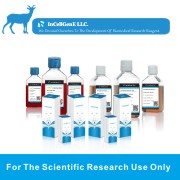

Overview
| Organism | Homo sapiens, human |
|---|---|
| Tissue | uterus; endometrium |
| Product Format | frozen |
| Morphology | epithelial |
| Culture Properties | adherent |
| Biosafety Level |
1
Biosafety classification is based on U.S. Public Health Service Guidelines, it is the responsibility of the customer to ensure that their facilities comply with biosafety regulations for their own country. |
| Disease | adenocarcinoma |
| Age | 71 years |
| Gender | female |
| Applications |
This cell line is a suitable transfection host.
|
Properties
| Karyotype | diploid to tetraploid with large submetacentric marker |
|---|---|
| Derivation |
This is a substrain of HEC-1-A (see ATCC HTB-112) isolated in 1968 by H. Kuramoto.
|
| Clinical Data |
female
|
| Antigen Expression |
Blood Type B; Rh+
|
| Tumorigenic | Yes |
| Effects |
Yes, in nude mice
(The cells form moderately well differentiated adenocarcinomas consistent with endometrial carcinoma (grade II).)
Yes, in steroid-treated hamsters
|
| Comments |
This is a substrain of HEC-1-A. Unlike HEC-1-A, this substrain exhibited a stationary growth period between the 135th and 190th days in culture and appeared on recovery to be flattened and more pavement patterned than the parent line.The predominant complement of chromosomes was double that observed for the parent line.
|
Background
| Complete Growth Medium |
The base medium for this cell line is ATCC-formulated Eagle''s Minimum Essential Medium, Catalog No. 30-2003. To make the complete growth medium, add the following components to the base medium: fetal bovine serum to a final concentration of 10%. |
|---|---|
| Subculturing |
Remove medium, and rinse with 0.25% trypsin, 0.03% EDTA solution. Remove the solution and add an additional 1 to 2 mL of trypsin-EDTA solution. Allow the flask to sit at room temperature (or at 37��C) until the cells detach. Add fresh culture medium, aspirate and dispense into new culture flasks.
Subcultivation Ratio: A subcultivation ratio of 1:2 to 1:6 is recommended |
| Cryopreservation |
Culture medium, 95%; DMSO, 5%
|
| Culture Conditions |
Temperature: 37��C
|


